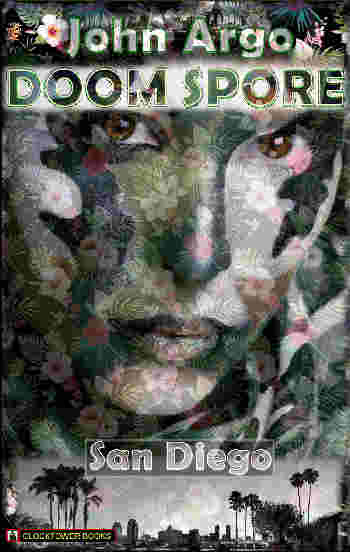Chapter 7
14.
 Hearing a gate creak in the nocturnal fog, the old security guard froze in his tracks. Hearing a gate creak in the nocturnal fog, the old security guard froze in his tracks.
The old man lived on a very meager Navy pension plus his Social Security. In a way, he had little to bitch about, he figured. He had three meals and a roof over his head at a cheap hotel downtown. He got his cigarettes, coffee, and liquor at the Navy Exchange at rock bottom prices, and he made a little on the side black-marketing cheap goods to local guys at a slight markup. He had cable TV, including several raunchy channels, and he drank himself to sleep every day with the cheap plastic curtains blowing in and out of the Victorian-era windows in the Gaslamp district. Plus, he made his drinking money and some to spare with his security guard job. Not that he needed the money so much, but he needed something steady and regular to do.
He didn't mind the noise of the young men and women partying two stories below—kind of made him feel not lonely. His schedule, though, was topsy-turvy. He would leave the room at 10:00 p.m. five evenings a week, walk over to the trolley exchange, and take the Orange Line down to the 32nd & Commercial trolley stop. There he'd walk through the Navy gate, showing his I.D., and then down the narrow little paths of dusty asphalt amid high wire fences, until he arrived at the concrete black building where his guard company had their headquarters. The guard company had people all over the city, all three shifts, 7/24, but the old man had this shift in this place sewed up and he liked it. He liked walking the quiet docks at night. About the worst he had to do was carry a heavy round time clock in a black leather case, on a black leather strap over one shoulder, and go from one key to another, turning it in the time clock to prove he'd been there—each key was numbered, and left an impression marking just that moment on a paper disk inside the time clock. He liked being near ships. He was an old Navy man, after all. He was just glad not to have to do all that work anymore, or supervise anyone, or put up with any more crap from poker-faced senior NCOs or wet behind the ears officers. He liked the solitude and the silence. He liked to stand sometimes and watch the nigh lights twinkle in dark, rippling water, or hear waves splashing softly under wooden piers, or hear the flap of a seagull's wings at night as it moved from one roost to another.
So what was different about this night? He froze in his tracks in mid-round, with the heavy time clock slung over his shoulder. About 150 feet away, seen through two or three wire fences, a group of men were leaving their ship. That much was obvious, from the lights and music aboard the small cargo freighter. They looked like Central or South Americans, he thought, wearing pea coats and watch caps, and carrying sea bags on their shoulders. Something odd about that scene made him stop and be very still, hoping he wasn't spotted. He had a little phone to call the dispatcher if there was any trouble, but he'd never had to use it so far in his three years with this company. What was it about those people? Their silence? Their lack of laughter or conversation? A certain deadness in their eyes? Must be 30 of them, and not one said anything to the man next to him. Usually men told jokes, laughed, lit cigarettes, nudged each other in a friendly way. Not these jokers. They moved in a way that suggested they didn't want to be seen. That aroused the old man's suspicions. Stealth. Could they be terrorists? Probably not 30 of them all at once, carrying sea bags unless those were filled with explosives. But there were easier ways to cause mayhem. What were they up to?
The old man realized too late that they'd seen him.
Clever outflanking maneuver.
He was watching the body of them walk away toward the main 32nd Street entrance, when he suddenly realized that three of them had detached themselves and had made a detour so that they came up behind him.
He turned, just in time to see a burly man in a pea coat draw near. "Hey," the old man said, "can I help you?" but it was too late. With one of them on either side, grasping his elbows, the burly one put his sea bag down and wrapped big powerful arms around the old man. The old man tried to cry out, but the other man opened his mouth and exhaled something that made the old man relax. As darkness closed in, he noticed the smell of the man embracing him— like a forest mushroom. The old man noticed that the man seemed to be made of old mushy plastic foam. He looked like a man, all right, but beneath the skin he was something else. Something moist, alien, dangerous. As he was dragged out of sight across a wooden dock, under the dock, to where the black silky night water lapped up on wet rocks, the old man relaxed and let himself go. He could just picture that cheap, torn plastic curtain billowing in the sweet night air as the thing that got him under the dock put its head close to his neck. The thing bit a hole open, inserted a shiny black tube that snaked into the old man, and started sucking life out of him.
Sometime much later that night, many hours later, a shape detached itself from under the dock. The shape that crawled up from the darkness and stood upright on the wharf was that of an elderly security guard with a severe case of missing personality. He wore the security guard uniform, looked just like the security guard, and flashed the right I.D. at the Navy gate, but he did not head for the trolley station. Instead, he began walking in the opposite direction—south, toward National City. He left behind him a long shape under the dock, in the darkest shadows where the gravel rose up to meet the rotting wood underbelly. There, a long wavy wood-like shape with many thin layers, and with powdery edges, now occupied a formerly empty space.
In fact the late night fog, a feature of the marine layer common in San Diego at this time of year, was filled with the figures of men silently walking away from the harbor. Each carried a sea bag over one shoulder. Each walked steadily, at a deliberate pace, toward some destination. Passing police cars did not stop to question them, because they looked like ordinary seamen.
The city, with nearly two million people, beckoned to the silently walking zombie spores.



|
  Thank you for reading. If you love it, tell your friends. Please post a favorable review at Amazon, Good Reads, and other online resources. If you want to thank the author, you may also buy a copy for the low price of a cup of coffee. It's called Read-a-Latte: similar (or lower) price as a latte at your favorite coffeeshop, but the book lasts forever while the beverage is quickly gone. Thank you (JTC). Thank you for reading. If you love it, tell your friends. Please post a favorable review at Amazon, Good Reads, and other online resources. If you want to thank the author, you may also buy a copy for the low price of a cup of coffee. It's called Read-a-Latte: similar (or lower) price as a latte at your favorite coffeeshop, but the book lasts forever while the beverage is quickly gone. Thank you (JTC).
|
TOP
|
MAIN
Copyright © 2014 by Jean-Thomas Cullen, Clocktower Books. All Rights Reserved.
|